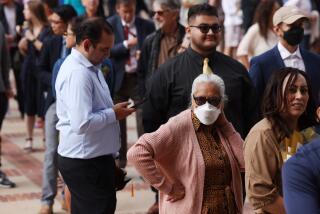Long Beach Asks Emergency Funds to Hold Off Tuberculosis Epidemic
- Share via
Public health officials say a sizable refugee community and a growing number of people infected with the AIDS virus have caused tuberculosis cases in Long Beach to more than double, prompting a request for emergency funds to hold off an epidemic.
Reported cases shot from 59 in 1988 to 128 in 1989, leaving Long Beach with one of the highest tuberculosis rates in the nation, according to a report filed by Dr. Marion Johnson, the city’s health officer.
The majority of the cases arise from the city’s immigrant communities, officials said. But for the first time, health officials are seeing a marked increase of tuberculosis in people infected with the human immunodeficiency virus that causes AIDS. The virus disables the immune system, leaving the patient vulnerable to the highly contagious disease that attacks the lungs, officials said.
“For the first time, we are experiencing a significant increase in AIDS and HIV-related tuberculosis as well as a significant increase in childhood tuberculosis,” Johnson wrote. “It is anticipated that the increase in cases in these populations will be a continuing influence on tuberculosis morbidity in the future.”
Johnson will ask the City Council on Tuesday to declare a health emergency for the tuberculosis outbreak and a similar epidemic of measles, which infected 100 people last year in the city and killed three children.
An emergency declaration would make the city eligible for $1.2 million in state funds to combat communicable diseases.
While the measles epidemic is the greater concern, the alarming rise in tuberculosis has health officials worried, particularly because 10% of the reported cases involved people infected with the HIV virus.
Public health officers want to quadruple physician and nursing staff hours to treat and follow up on a soaring number of tuberculosis patients, said Health Department Director Diana Bonta.
“We just don’t have the manpower,” epidemiologist John Aguirre said. “We have problems getting patients to us, and we don’t have the people to go out to them.”
The Health Department’s policy is to track patients who fail to comply with the treatment regimen, but because of staff shortages, many are marked “lost,” Aguirre said.
Tuberculosis is potentially deadly but highly treatable with proper care, officials said.
The emergency funds would be used to inform high-risk communities, such as immigrant populations with limited access to health care, Bonta said.
“Many of them are living in poverty, many don’t have access to medical care and many, many are in and out of the school system,” she said. “We just want to do some prevention here.”
More to Read
Sign up for Essential California
The most important California stories and recommendations in your inbox every morning.
You may occasionally receive promotional content from the Los Angeles Times.










